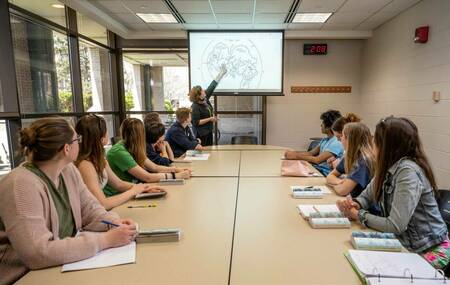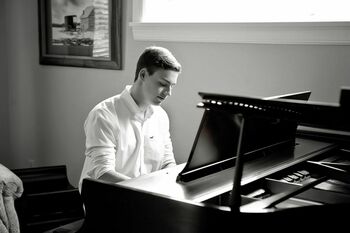Curriculum
Small classes, big ideas

The Glynn Program offers exclusive humanities seminars where you satisfy some of the university's Core Curriculum requirements in small classes with other Glynn Scholars.
In the sciences, you can take special Glynn seminars in math and science or advanced departmental courses, depending on your major and your academic interests.
The Glynn program also secures reserved seats in some of the most popular electives on campus.
In their senior year, Glynn Scholars take special courses on research, writing, and presentation as they write their senior theses.
Honors Seminar
In their first year, Glynn Scholars take the year-long Honors Seminar, a writing-intensive journey through core works of literature and intellectual history. Seminar discussions cover questions from free will and responsibility, the demands of justice, and the nature of time to the role of fate in Greek tragedy and the place of narrative in modern fiction. Class size is around 12–14.
Honors Philosophy
A general introduction to philosophy, taught in a seminar format for Glynn students, with emphasis on perennial problems such as the existence of God, human freedom, and moral obligation. The course is also intended to sharpen the student's skills of critical thinking. Students may take Honors Philosophy in their first or second year. This course satisfies the University's first philosophy requirement. Class size is around 15–18.
Honors Theology
A study of the Bible and early Christian tradition. Students reflect theologically on the Old and New Testaments and major post-biblical developments in Christian life and worship (e.g., liturgy, theology, doctrine, asceticism), emphasizing the first five centuries. This course satisfies the University's first theology requirement. Students generally take Honors Theology in their sophomore year, though students intending to major in Theology may take it in the first year, or take a different course offered by the Department of Theology for prospective majors. Class size is around 18–20.
Honors Science

Glynn Scholars can satisfy the University's two science requirements in a number of ways.
Quarks to Quasars, a science course developed for Glynn Scholars in Arts and Letters, covers the physics of the very small, the very large, and everything in between. Big History considers the origins of life on earth and the natural history of its evolution over millennia. Glynn Scholars in Arts and Letters can take these courses or enroll in approved courses in the College of Science.
Glynn Scholars majoring in the College of Science and the School of Architecture take courses in the College of Science as determined by their major and their area of interest. See our Guide to the Curriculum for more details.
Honors Math
All Glynn Scholars are required to take two mathematics courses. You can choose from special, innovative Glynn math courses, devised for Arts and Letters students, that bring the subject to life and reveal its underlying beauty. You can take challenging calculus courses in the math department. Or you can take advanced quantitative courses in your major that satisfy Glynn requirements. See our Guide to the Curriculum for more details.
Glynn electives
Each semester the Glynn Program secures seats in popular elective courses in departments across Arts and Letters, from history and English to psychology, art history, film, political science, and more. We circulate a list of available courses prior to registration each semester.
Senior thesis

Glynn Scholars write a year-long senior thesis, often in conjunction with their major or a minor or certificate program. All Glynn Scholars take a one-credit course their senior fall, where they share research results and practice presentation skills, and a one-credit course their senior spring that supports their writing. The senior thesis may consist of independent research, a creative project, or a performance.